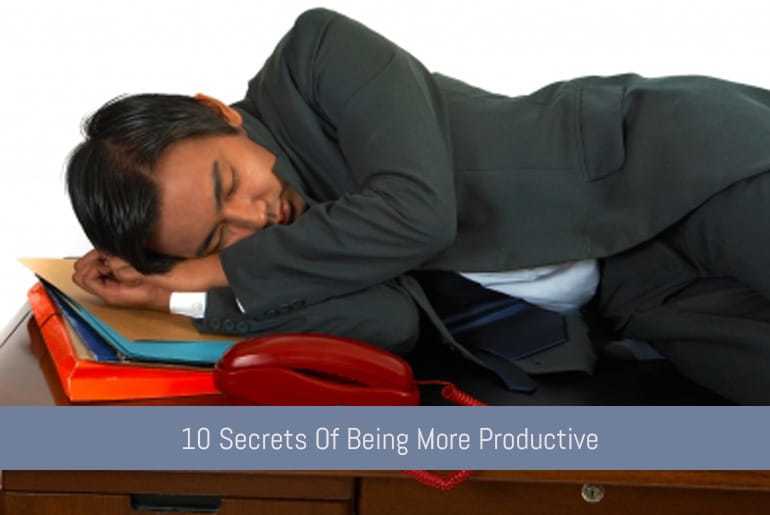10 Secrets Of Being More Productive
In this guest post Will Bridges looks at 10 simple ways you can be more productive at work (whether that be a “proper” or home office) and how your interactions with colleagues can affect your productivity.

For many of us it can seem as though there aren’t enough hours in the day and trying to fit everything in can be a struggle. With our busy lifestyles, both in and outside of the office, it’s important to be able to get everything done and still have time to unwind at the end of the day. Fortunately, these ten secrets to being more productive could help you and your employees stay motivated to tackle that to-do-list…
1. Get physical
Taking some time to do exercise each day, whether in the form of a brisk walk or something more strenuous, can help to increase productivity. Getting away from your desk to take a stroll outside can not only help with your physical health but also give your mind a break from work.
2. Be aware of your body clock
The differences in our bodies aren’t just skin deep, in fact we all have differing body clocks. For some they’re at their most productive first thing in the morning, while others work better later in the day. Therefore, it’s important to figure out what works best for you and your staff; could you allow for more flexible working pattern to fit in with the individuals in your team?
3. Prioritise
Learning to prioritising your workload will help improve your productivity and efficiency. Empower your team to decide which tasks are the most important and a realistic time frame for completion. This will help to organise time accordingly, set expectations and take some of the stress out of the day. Perhaps setting up a meeting at the start of the week would help to organise schedules.
4. Work in batches
Encourage your staff to group together similar tasks and kill two birds with one stone, as the saying goes. For example, if you need to respond to emails or take calls, then try to schedule some time to do these in one go – in the long run it’ll help to free up some time.
5. Delegate
Knowing when to delegate tasks can be fundamental to being productive. Assigning tasks to others who have more time available to them is often the best option to ensure that all tasks are completed by a deadline and with minimum stress.
6. Identify time hoggers
There are always activities that take us a bit longer than necessary, or habits we fall into that may result in procrastination. Identifying which activities these are for you and your team and working to change how you approach them will help to improve your time management and will result in immediate results.
7. Don’t be afraid to take breaks
Employees don’t have to go for a walk outside to take a break. Set a good example and promote taking a time out to gather your thoughts. While taking a break to improve productivity might sound counter intuitive, it will actually have results. When undertaking complex tasks that require a great deal of mental effort, go and make a drink – it could help you to come back with renewed energy and give you a boost to carry on with the task in hand.
8. Make boring tasks fun
There will inevitably be some tasks that we may find less interesting or tedious, and as such it can be hard to motivate ourselves to do them. By finding small ways to make the tasks a bit more fun, staying focused might be a bit easier. For example, perhaps encourage staff to listen to their favourite tunes. Alternatively, take team meetings to a new setting, such as a breakout space, or even have a walking meeting to ensure they don’t last any longer than necessary.
9. Keep it brief
Writing emails can take up a chunk of your day, so where possible keep them as brief as possible. Keeping emails that don’t require a lot of information under five sentences can be a good way to save time for both you and the recipient.
10. Keep a tidy work space
This might sound simple but it can be very effective. Keeping a tidy desk will allow you to find any documents or stationary you need more easily. This doesn’t just apply to the work environment, just think about cooking and how much more effective it is to clean up after yourself there and then rather than waiting until the next time you cook. The fundamentals behind this also apply to your work space, by tidying after finishing a task you’ll reduce the amount of time between finishing one task and starting another.
As you can see there are many small changes you can make to your day to boost you and your team’s productivity, so why not give some of them a try.

